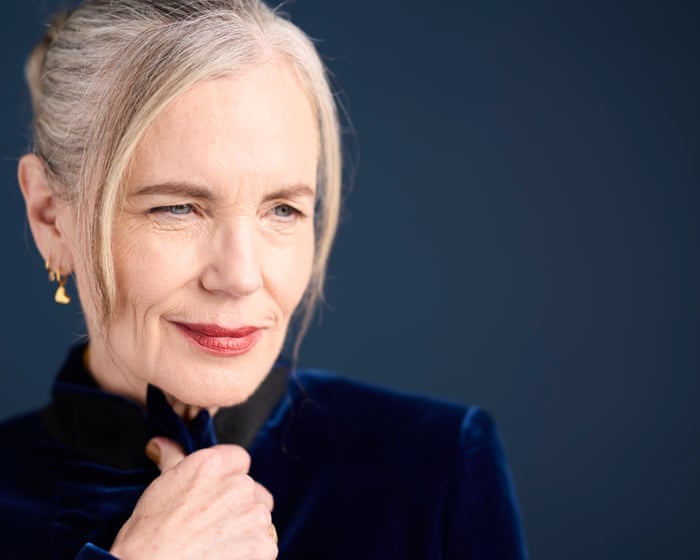For those prone to sentimentality, the final Downton Abbey film might need a cautionary note. Every moment carries a bittersweet tone—a farewell to beloved characters and to the grand estate that stood as a constant in an ever-changing world. When the ITV series began in 2010, didn’t life feel… simpler? Did Elizabeth McGovern also sense the passage of time? After all, her character, Cora, is now stepping aside with her husband, Lord Grantham, as the younger generation takes over Downton in the dawning 1930s.
“No!” McGovern exclaims, snapping me out of my wistful mood. “I’m actually thrilled to be entering a rewarding new chapter in my career.” Beyond reprising Cora, she’s written a play, Ava: The Secret Conversations, in which she stars as Hollywood icon Ava Gardner. After its London debut in 2022, it will tour New York, Chicago, and Toronto. She’s also releasing a new folk-inspired album. “I feel like I’m just getting started,” she says as we meet in her publicist’s London office. At first glance, McGovern appears delicate—petite and poised—but underestimating her would mean missing her fierce independence.
“I was never desperate. I could walk away. A lot of young women weren’t so lucky.”
Not that filming Downton Abbey: The Grand Finale wasn’t emotional. “As filmmakers, we didn’t have to dig deep to capture that feeling—we’ve lived with these characters for so long,” she says. McGovern initially worried that Maggie Smith’s absence (the legendary actress, who played the sharp-tongued Dowager Countess, passed away last year) would leave a void. But Smith’s presence, she insists, still lingers. “She’s everywhere—in every room, every interaction. It’s strange, but it doesn’t feel like she’s gone. Her absence actually lets the story flow without pausing for her moments, yet everything she stood for remains.”
The women of Downton—whether the formidable Lady Mary or the spirited cook Daisy—are refreshingly strong. Cora, though often quietly supportive in the background, never seemed as resilient, despite her American fortune keeping the estate afloat. Was that frustrating to portray? “Sometimes, yes,” McGovern admits. “As a modern woman, it’s hard to grasp the constraints of that era.” Did she ever push for Cora to have more agency? “I wish she’d had more compelling storylines,” she says, “but giving her greater political or social influence wouldn’t have been true to the times.”
Cora, however, embodies an exciting vision of America—a Jewish immigrant’s daughter who shakes up British aristocracy with her new money and progressive ideals. If Downton were set today, she might be a wealthy liberal fleeing Trump’s America, much like Ellen DeGeneres. McGovern, a California native who’s lived in the UK for 32 years, is disheartened by U.S. politics.
“This reality must have been simmering beneath the surface,” she reflects. “It didn’t come from nowhere.” Still, ever the optimist, she adds, “It’ll be painful, but we have too much history as a free country to let it slip away. It’s on all of us to peacefully protect what I once took for granted.”Here’s the rewritten text in fluent, natural English:
—
McGovern found early success in Hollywood. Her debut was in Robert Redford’s 1980 film Ordinary People, and she earned an Oscar nomination for her second film, Ragtime. She then starred opposite Robert De Niro in Sergio Leone’s Once Upon a Time in America.
“At first, I thought, ‘This isn’t as hard as people say,’” she says with a smile. “But later, I realized how tough it really is. Early on, I was just trying to stay grounded, take job after job, and grow up—like most people my age. It wasn’t until later that I understood how hard it is to maintain a career.”
McGovern didn’t come from a showbiz family—her parents were teachers. Though she loved acting from a young age, she never chased fame. That mindset may have shielded her in an industry that can be harsh, especially for young women. “I was never desperate, so I could always walk away. A lot of women didn’t feel they had that choice. I was lucky.”
She also saw the downsides of fame firsthand. “I avoided it myself, but fame makes real intimacy difficult. You become collateral—your whole identity is commodified, and that creates tension in relationships.”
Early in her career, McGovern often played the girlfriend or the perfect wife. “Most films and TV are told from a man’s perspective,” she says. “It’s so ingrained that audiences don’t even notice. I didn’t at first. My job was to fulfill a man’s fantasy of the ideal woman. I never questioned it.”
In the 1994 comedy The Favor, Brad Pitt played her boyfriend. Now, she jokes, she’d likely be cast as his mother—even though she’s only three years older than him. “Society’s expectations don’t have to define us,” she says. “I try to teach my daughters that. We can think for ourselves. I’ve always done my own thing.”
When I mention how rare it is in Hollywood to embrace gray hair, she bristles slightly. Was it a political choice? “Not really. But it’s frustrating that women my age are always asked about this. Society needs to change.”
McGovern has always forged her own path. She left Hollywood for London to raise a family with her husband, filmmaker Simon Curtis (The Grand Finale). In her 40s, she started a band, Sadie and the Hotheads, and released music. “I remind myself that people will either like it or they won’t—and that’s fine. What matters is doing it.”
In her 50s, she wrote a play about actress Ava Gardner, drawn to her independent spirit. Now in her 60s, she’s working on a screenplay—though she won’t reveal details. “It’s my next obsession. I’m excited to write.” For her, it’s also a way to create meaningful roles as an older actor. There’s certainly been plenty of…
—
(Note: The last sentence was cut off in the original, so I left it incomplete as well.)Here’s a more natural and fluent version of your text:
When asked if she thinks the situation has improved, she replies, “Not that I’ve noticed.”
[Image description: Elizabeth McGovern with Aaron Costa Ganis in “Ava: The Secret Conversations” in New York, showing her independent spirit. Photo by Jeff Lorch/AP]
She particularly enjoyed the recent show “Dying for Sex,” where Michelle Williams portrays a woman in her 40s with a terminal illness who explores her sexuality one last time. “It’s such a powerful female story. I found it really encouraging, though it’s not about someone my age.” Why is that? Is it because society finds the idea of older women having sex surprising? “I think that might be true, yes. But what can we do as women except keep living our lives and refuse to accept those limitations? We don’t have any other choice.”
If it requires some effort, the rewards are clearly worthwhile – as McGovern and her perspective demonstrate. “It’s a daily practice of focusing on what really matters. I don’t blame anyone for accepting how things are, but that doesn’t mean I have to. Absolutely not.” She laughs. “No way.”
Note: “Downton Abbey: The Grand Finale” releases on September 11 in Australia and September 12 in the UK and US. “Ava: The Secret Conversations” runs at New York City Center through September 14.
FAQS
### **FAQs: Elizabeth McGovern on Her Role in “Downton Abbey,” Early Stardom, and Working with Brad Pitt**
#### **General Questions**
**Q: What did Elizabeth McGovern mean by saying her role was to “bring a man’s fantasy to life”?**
A: She was reflecting on how early Hollywood often cast women in idealized, romanticized roles designed to appeal to male audiences rather than portraying complex, realistic characters.
**Q: Which role was she referring to when she made that comment?**
A: While she didn’t specify a single role, she was likely reflecting on her early career in films like *”Ragtime”* and *”She’s Having a Baby,”* where she played the archetypal “dream girl.”
**Q: How did her experience in *Downton Abbey* differ from her early roles?**
A: In *Downton Abbey*, she played Cora Crawley, a more layered and developed character, unlike the one-dimensional “fantasy” roles she had earlier in her career.
—
#### **Career & Early Stardom**
**Q: What was Elizabeth McGovern’s breakout role?**
A: Her breakout role was in *”Ordinary People”* (1980), but she gained wider fame for *”Ragtime”* (1981), which earned her an Oscar nomination.
**Q: Did she enjoy her early fame in Hollywood?**
A: She has said that while she appreciated the opportunities, she struggled with the industry’s expectations and the lack of substantial roles for women.
**Q: Why did she move from Hollywood to British television?**
A: She sought more meaningful roles and found *Downton Abbey* offered the depth she wanted, unlike many Hollywood scripts at the time.
—
#### **Working with Brad Pitt**
**Q: When did Elizabeth McGovern work with Brad Pitt?**
A: They starred together in *”The Favor”* (1994), a romantic comedy where Pitt played her love interest.
**Q: What was her experience like working with Brad Pitt?**
A: She has spoken fondly of him, calling him a natural talent and a kind, professional actor even before his massive fame.
**Q: Did she know Brad Pitt would become such a huge star?**
A: She has said



